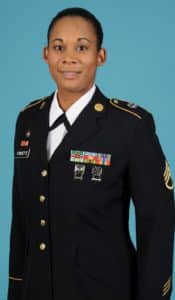
Poinsette. Courtesy of
Jackie Poinsette
SAN ANTONIO (Jan. 13, 2022) – After nearly 13 years in the Army as a laboratory technician, Staff Sergeant Jackie Poinsette was ready to separate from the military and put down roots in San Antonio with her 11-year-old son. The Department of Defense SkillBridge Program enabled her to intern at Texas Biomed during the last six months of her service, and this led to a job helping manage the high-containment laboratory of Professor Ricardo Carrion, Jr.
For Texas Biomed, partnership with the SkillBridge program is an extension of its longtime commitment to community education and to supporting military members in San Antonio and beyond. The initiative is helping service members make what is often the hardest transitions in their lives: from the military to civilian world.
“A lot of people leave the military and can’t let go – it’s all that they’ve known their whole lives,” Poinsette says. “SkillBridge helps relieve the stress and anxiety of ‘what am I going to do?’ Having the break to focus on the transition and not worry about any of the military things, it helped me to take the uniform off.”
The SkillBridge program is also a boon for employers: a large pool of talent that can learn about an organization, at no cost to the employer because service members are still on active duty and paid by the military. While there is no guarantee companies will hire participants, it can amount to an extended job interview that works out.
“From Texas Biomed’s perspective, this program is equally beneficial because talented people who know the military organizations we regularly partner with on research projects are bringing their experience to us – we are learning from them,” says Teresa Evans, director of research education at Texas Biomed.
While many companies participating in SkillBridge do not require specific training prior to internships, Texas Biomed has found success matching with candidates trained in the medical sciences and research.
Poinsette is a shining example of this, bringing a unique combination of skills and experiences built up through the military.
She holds a bachelor’s degree in clinical laboratory science from George Washington University, and specialized as one of 40 Army cytotechnologists, which involves running tests that can identify viral and bacterial infections as well as precancerous and cancerous cells for patients. She has experience managing a busy laboratory, having run the clinical lab for a 240-bed hospital.
She also conducted research in high-containment laboratories at the U.S. Army Medical Research Institute of Infectious Diseases. “I worked on bacteria and that’s all I can tell you,” Poinsette says, not joking. (Well, mostly… she was able to publish a couple of research papers early in her military career.)
All of this training and expertise made her a perfect fit for Texas Biomed, which has the only independent BSL-4 in the country (the highest level of biocontainment labs), along with several BSL-3s. These labs provide the safe, regulated facilities for studying infectious pathogens, from anthrax to Zika, and testing treatments, vaccines and diagnostics, including the Pfizer-BioNTech COVID-19 vaccine and Regeneron’s monoclonal antibody cocktail.
“I like the 3 and 4 containment environments,” Poinsette says. “It is a shared space, so people take good care of it and make sure to do things the right way. It’s more mindful.”
Poinsette says she also enjoys the high-pace work tempo with numerous ongoing COVID-19 studies for vaccines and therapeutics, which are carried out in the BSL-3.
As a part-time research associate at Texas Biomed, she helps oversee logistics, streamlining processes for ordering supplies and maintaining equipment, and helping others improve workflows so they are more efficient. She also helps ensure the labs are always ready for inspection by federal agencies.
“Based on my experience in both research and clinical settings, I get the big picture of what we are doing here and the end user product: future treatments and therapies,” she says. “And, we have to know they are safe to go to the public.”
In addition to her work at Texas Biomed, Poinsette continues to keep her lab tech skills sharp at Labcorp, and has recently completed her Master’s degree in biotechnology and a certificate in leadership and management from the University of Maryland.
She encourages other service members who are struggling with the idea of transitioning to civilian life to give SkillBridge a chance. While some decide to stay in, many can take away new skills, new connections and a new perspective.
“You can have a life outside the military, and it is going to be OK,” she says.
While incredibly grateful for her time in the military, she knows starting a civilian career in San Antonio was the right decision for her.
“I would not have landed here if it were not for my military career, but that is just one chapter,” she says. “It’s time to start a new chapter.”
###
ABOUT TEXAS BIOMED
Texas Biomed is one of the world’s leading independent biomedical research institutions dedicated to eradicating infection and advancing health worldwide through innovative biomedical research. Texas Biomed partners with researchers and institutions around the world to develop vaccines and therapeutics against viral pathogens causing AIDS, hepatitis, hemorrhagic fever, tuberculosis and parasitic diseases responsible for malaria and schistosomiasis disease. The Institute has programs in host-pathogen interaction, disease intervention and prevention, and population health to understand the links between infectious diseases and other diseases such as aging, cardiovascular disease, diabetes and obesity. For more information on Texas Biomed, go to www.TxBiomed.org.